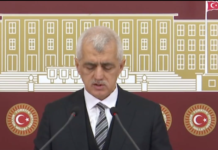Images on social media of an ailing 83-year-old man incarcerated in Diyarbakır Prison being taken to a hospital in handcuffs has caused outrage among activists, who are demanding his immediate release.
Rewşa girtiyê nexweş Mehmet Emîn Ozkan (Apê Dedo) carek din xera bû û destê wî kelemçe kirin û birin nexweşxaneyê. Di dîmenên hatine girtin de tê dîtin ku Ozkan bi zorê xwe li ser pêya digirehttps://t.co/bscPqw2ks5pic.twitter.com/0wpreYyd05
— Ajansa Mezopotamya (@Makurdi4) May 26, 2021
Mehmet Emin Özkan was seen barely able to walk despite the support of two guards., In prison for the past 25 years, Özkan has suffered four heart attacks. He has other health problems as well, such as high blood pressure, toxic goiter, osteoporosis, kidney disease, memory loss and loss of hearing and sight.
Özkan’s daughter, Selma Özkan, called on authorities to end her father’s suffering and release him before he dies in prison.
Speaking to the Duvar news website, lawyer and human rights activist Eren Keskin said Özkan and other sick inmates should be released immediately. “Political prisoners with multiple health problems are issued medical reports saying they are fit to remain in prison,” she added.
Bu adam Mehmet Emin Özkan.. Ağır hasta ..pic.twitter.com/shHthpmQeC
— Eren Keskin (@KeskinEren1) May 26, 2021
A medical report issued for Özkan on March 3 confirmed his health problems but said “he can lead an independent life and take care of his needs.” It also said Özkan’s health required regular monitoring. A medical report issued in 2015 had said Özkan was almost totally disabled and not fit to remain in prison.
Özkan was sentenced to aggravated life for alleged membership in the outlawed Kurdistan Workers’ Party (PKK). He was found responsible for the death of Brig. Gen. Bahtiyar Aydın in October 1993.
Özkan has denied any responsibility in the incident.
The charges against Özkan were based on two witness testimonies that were later recanted. In a 2014 indictment for what is known as the “Lice trial,” the Diyarbakır Public Prosecutor’s Office said there was no tangible evidence that Özkan had ever taken part in terrorist activities. The trial concerned the alleged illegal activities of gendarmerie intelligence units known as JİTEM.
The PKK has been waging an armed insurgency against Turkey’s security forces since the ’80s in a campaign that has claimed the lives of some 40,000 people. The group is listed as a terrorist organization by Turkey, the European Union and the US.
Özkan is now awaiting a decision on a retrial and has a hearing on May 6.
Human rights activists and opposition politicians have frequently criticize authorities for not releasing critically ill prisoners so they can seek proper treatment. Human rights defender and former Peoples’ Democratic Party (HDP) deputy Ömer Faruk Gergerlioğlu said ill prisoners were not released until they were at the point of no return.
According to the most recent statistics published by the Human Rights Association (İHD), the number of sick prisoners is in the thousands, more than 600 of whom are critically ill. Although most of the seriously ill patients have forensic and medical reports deeming them unfit to remain in prison, they are not released. Authorities refuse to free them on the grounds that they pose a potential danger to society.
A number of critically ill prisoners passed away in 2020 because they were not released in time to receive proper medical treatment.
Since April 2020, four seriously ill prisoners over the age of 70 have died in penal institutions in Turkey; five inmates suffering from cancer died shortly after they were released; and 16 died of chronic illnesses while imprisoned.















